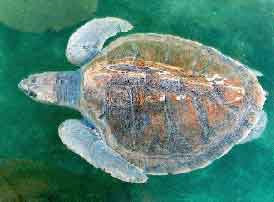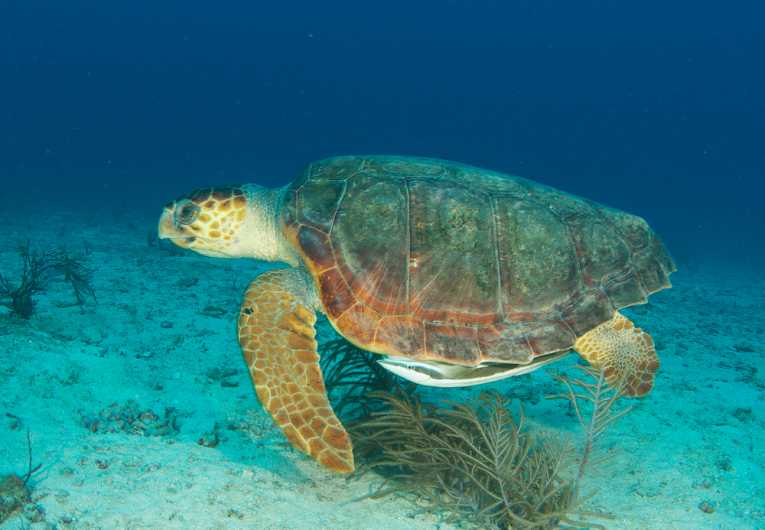

| Weight: | Adult: up to 2,000 pounds (900 kg) Hatchling: 1.5-2 ounces (40-50 g) |
| Length: | Adult: 6.5 feet (2 m) Hatchling: 2-3 inches (50-75 cm) |
| Appearance: | primarily black shell with pinkish-white coloring on their belly |
| Lifespan: | unknown |
| Diet: | soft-bodied animals, such as jellyfish and salps, and pyrosomes |
| Behavior: | females lay clutches of approximately 100 eggs several times during a nesting season, typically at 8-12 day intervals |

| Weight: | Adult: 100 pounds (45 kg) Hatchling: 0.5 ounces (14 g) |
| Length: | Adult: 24-28 inches (60-70 cm) Hatchling: 1.5 inches (3.8 cm) |
| Appearance: | grayish-green, nearly circular, top shell with a pale yellowish bottom shell |
| Lifespan: | unknown |
| Diet: | crabs, fish, jellyfish, and mollusks |
| Behavior: | "arribada" nesting, where large groups gather and come ashore and nest all at once |

| Weight: | Adults: 300-350 pounds (135-150 kg) Hatchlings: 0.05 pounds (25 g) |
| Length: | Adults: 3 feet (1 m) Hatchlings: 2 inches (50 mm) |
| Appearance: | top shell (carapace) is smooth with shades of black, gray, green, brown, and yellow; their bottom shell (plastron) is yellowish white |
| Lifespan: | unknown, but sexual maturity occurs anywhere between 20-50 years |
| Diet: | seagrasses and algae |
| Behavior: | females return to the same beaches where they were born ("natal" beaches) every 2-4 years to lay eggs, generally in the summer months |

| Weight: | Adult: 100 pounds (45 kg) Hatchling: <1 ounce (28 g) |
| Length: | Adult: 22-31 inches (55-80 cm) Hatchling: 1.5 inches (4 cm) |
| Appearance: | olive/grayish-green (darker in the Atlantic than in the Pacific) with a heart-shaped top shell ("carapace") and 5-9 pairs of costal "scutes" with 1-2 claws on their flippers; hatchlings emerge mostly black with a greenish hue on their sides |
| Lifespan: | unknown, but they reach sexual maturity at about 15 years |
| Diet: | algae, lobster, crabs, tunicates, mollusks, shrimp, and fish |
| Behavior: | one of the most extraordinary nesting habits in the natural world, vast numbers of olive ridley turtles come ashore and nest in what is known as an "arribada"; females nest every year, once or twice in a season, laying clutches of approximately 100 eggs |

| Weight: | Adult: 250 pounds (113 kg) Hatchling: 0.05 pounds (20 g) |
| Length: | Adult: 3 feet (~1 m) Hatchling: 2 inches (4 cm) |
| Appearance: | reddish-brown, slightly heart-shaped top shell ("carapace") with pale yellowish bottom shell ("plastron"); hatchlings are brown to dark gray |
| Lifespan: | unknown, but they reach sexual maturity at around 35 years old |
| Diet: | whelks and conch |
| Behavior: | females nest from April-September and generally lay 3-5 nests per season |

| Weight: | Adult: 100-150 pounds (45-70 kg) Hatchling: 0.5 ounces (15 g) |
| Length: | 25-35 inches (65-90 cm) |
| Appearance: | top shell (carapace) is dark to golden brown, with streaks of orange, red, and/or black with a serrated back and overlapping "scutes", while the bottom shell (plastron) is clear yellow; hatchlings are mostly brown |
| Lifespan: | unknown |
| Diet: | sponges and other invertebrates, algae |
| Behavior: | females return to the beaches where they were born (natal beaches) to nest, which occurs every 2-3 years at night and approximately every 14-16 days during the nesting season |

Information for this page is from NOAA. For more information, visit NOAA's Endangered Species Conservation page.